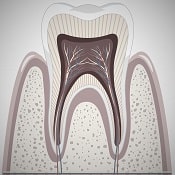

What is Root Canal Treatment?
'Root canal' is the term used to describe the natural cavity which is in the centre of the tooth. The pulp or pulp chamber is the soft area between the root canal where the tooth nerve also lies.
Root canal treatment is a dental procedure that is performed to repair and save a tooth that is badly decayed or has become infected. During a root canal procedure, the nerve and pulp are removed and the inside of the tooth is cleaned and sealed by a filling. Without treatment, the tissue surrounding the tooth will become infected causing abscesses. Patients need a root canal when there is inflammation or infection in the roots of a tooth which is shown by symptoms such as pain when eating, drinking or chewing. Root canals are designed to save the tooth and prevent extraction. The roots of our root-canaled teeth are still alive.
Root canal therapy eliminates bacteria from the infected root canal, prevents reinfection, and saves the original tooth. The inflamed or infected pulp is removed from the tooth, and then the inside of the tooth is cleaned and disinfected before it can be filled and sealed.
In a root canal treatment, the inflamed or infected pulp is removed and the inside of the tooth is carefully cleaned and disinfected, then filled and sealed. The tooth is filled with a crown or filling for protection so that it continues to function like any other tooth. Root canal treatment is a virtually painless procedure and often leaves you with less discomfort during recovery than if you have your natural tooth extracted and is also cost-effective. With proper care, most teeth that have had root canal treatment can even last a lifetime.
Endodontists specialize in tooth discomfort, disease, and infection; they have special training to perform root canal treatments.
The different types of root canal treatments include:
Your doctor will provide you with detailed information on preparing for your procedure. Some preparations can be:
A single root canal session can last between 30 and 60 minutes on average, but in complicated cases, your dentist might need more time.
Many people think getting a root canal treatment will be painful and will cause them a lot of discomfort. However, this is not true in all cases. Since the source of your dental problem is eliminated during the root canal, most people feel instant relief. But, if you have throbbing pain following a root canal, contact your healthcare professional immediately.
The following risks are associated with getting a root canal treatment:

Root canal treatment is a highly successful procedure and has a success rate of more than 95%. However, its still important that you look after your teeth when recovering from a root canal treatment. You should avoid biting on hard foods until all your treatment is complete. Over-the-counter painkillers also can be used to relieve any discomfort.
To prevent the need for further root canal treatment, follow these steps:
If you have already had a root canal please take care of the following things:
View Surgeries to book an online surgical procedure through Marham.pk or you can also call us at 042-32591427 or 0311-1222398 from 9 am - 11 pm to book an online lab test.
Cost varies depending on the type of surgery and locality.
Yes Root Canal Treatment surgery available in Pakistan?
Our qualified team get back with authentic answers!